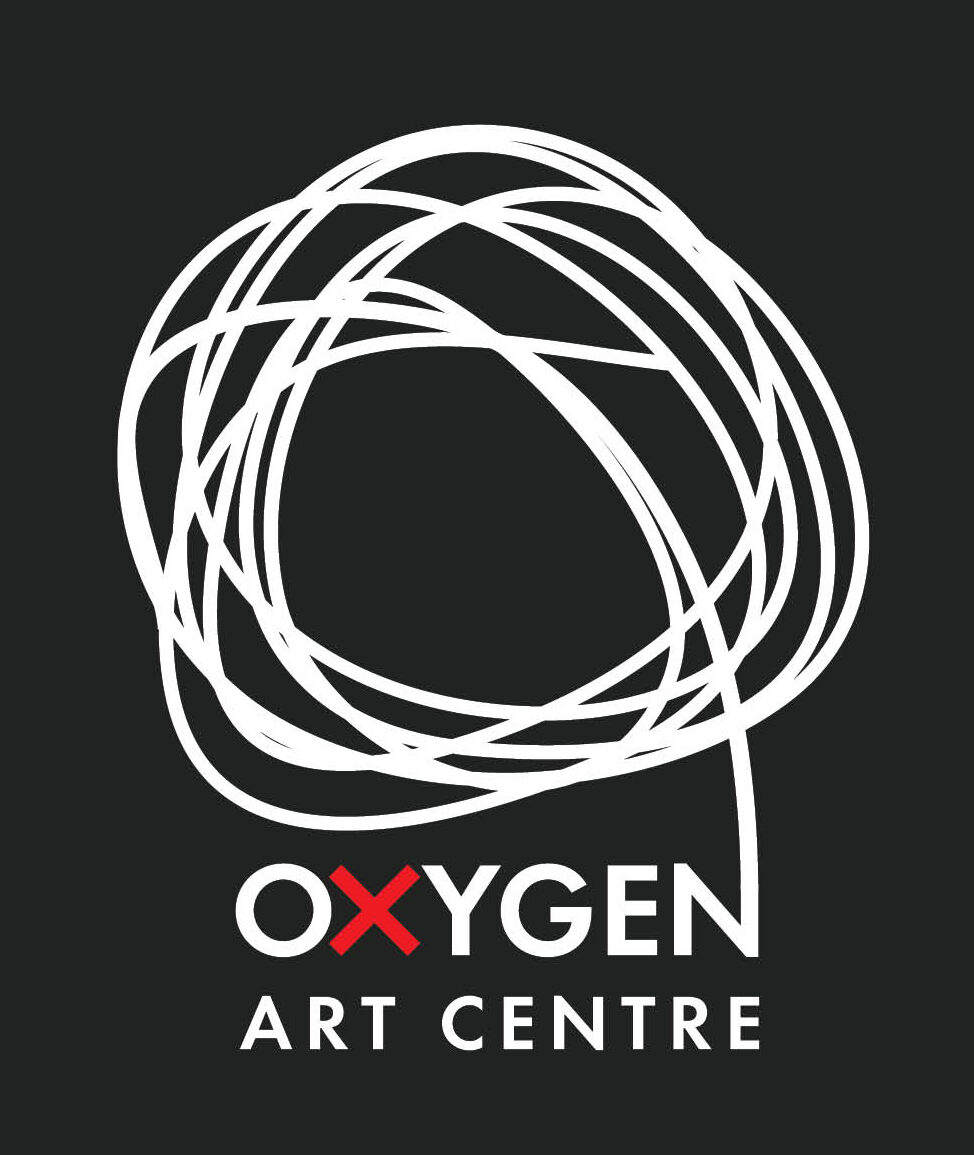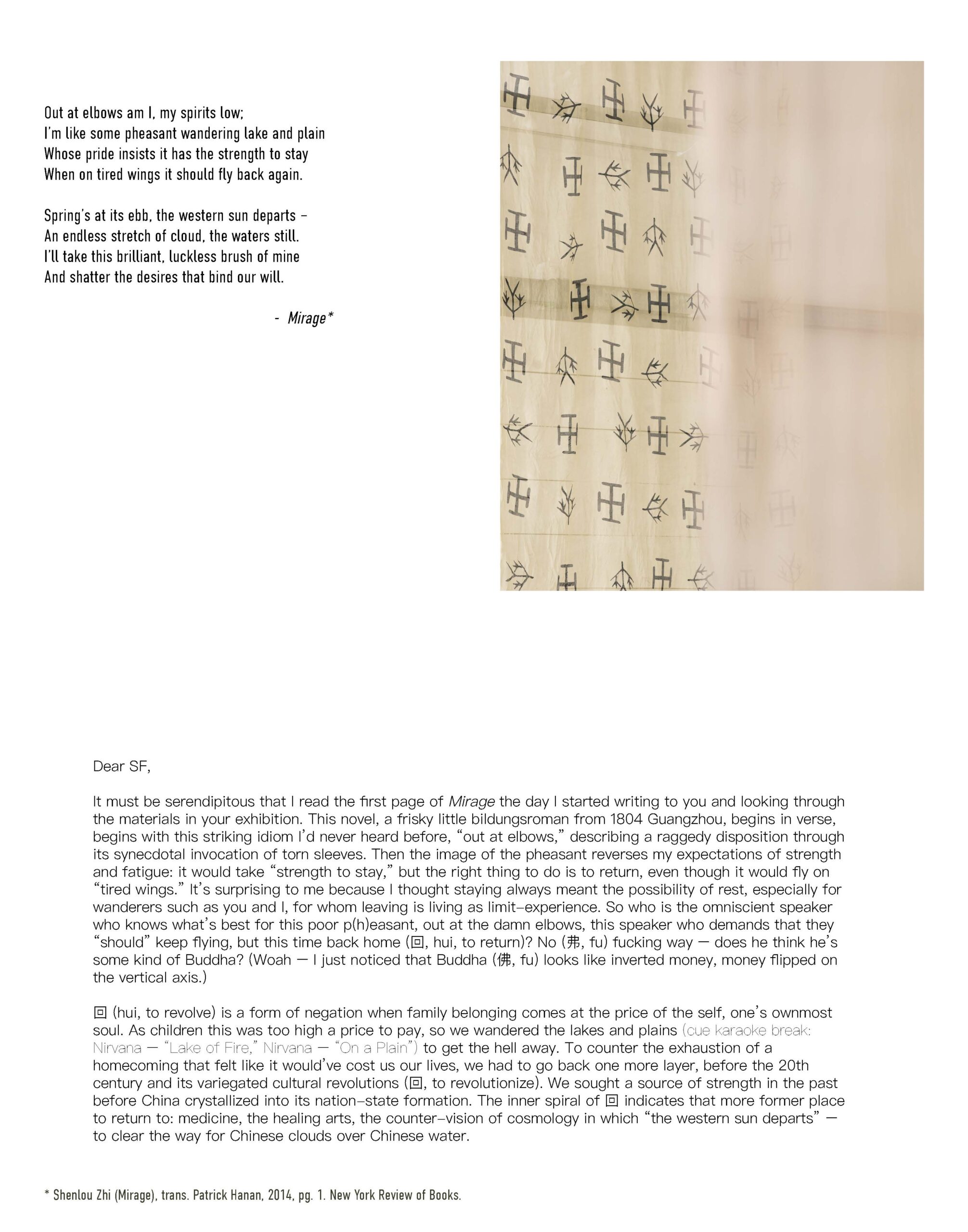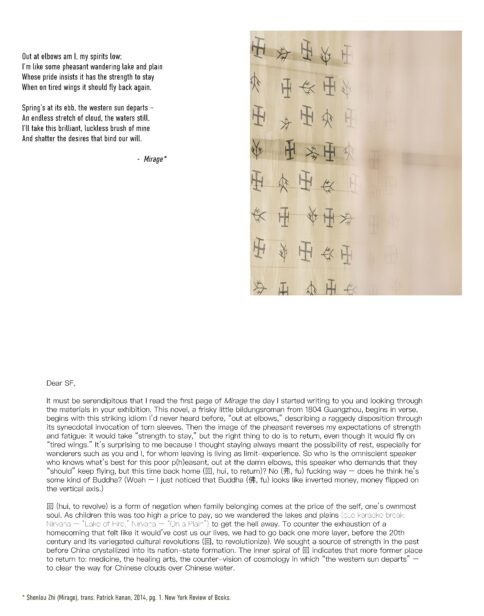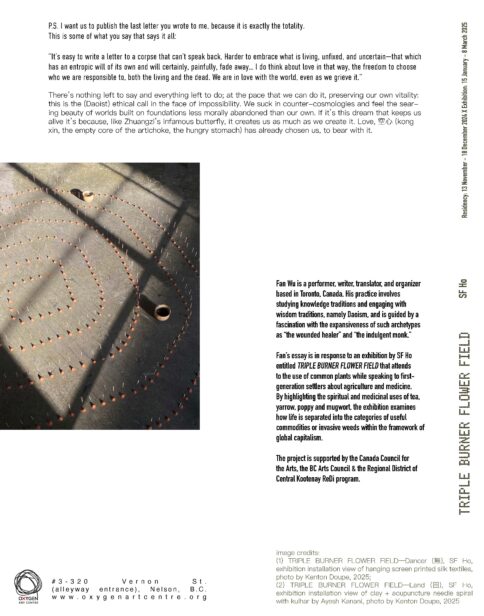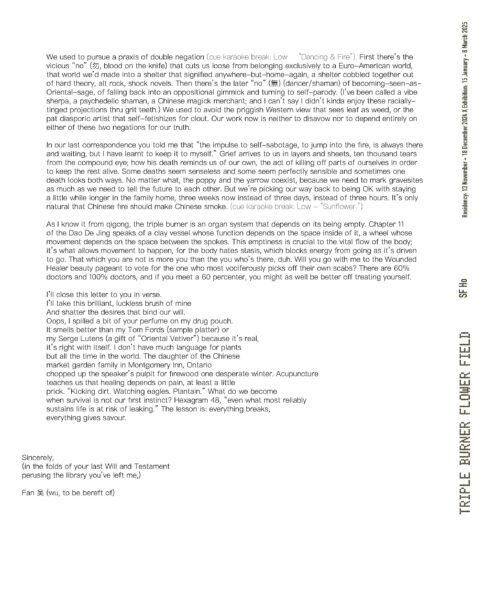Oxygen Art Centre is delighted to share Fan Wu’s response to SF Ho’s exhibition, TRIPLE BURNER FLOWER FIELD, in its’ digital form.
We share this text as a nibble in anticipation for the print exhibition catalogue, forthcoming February 2026. The catalogue will include Fan’s text alongside an essay by Chanelle Adams, design by A Jamali Rad, documentation by Kenton Doupe, and other related writing and ephemera.
Fan Wu is a performer, writer, translator, and organizer based in Toronto, Canada. His practice involves studying knowledge traditions and engaging with wisdom traditions, namely Daoism, and is guided by a fascination with the expansiveness of such archetypes as “the wounded healer” and “the indulgent monk.”
TRIPLE BURNER FLOWER FIELD is an exhibition by SF Ho that was on view at Oxygen Art Centre from January 15 – March 8, 2025. Read Fan’s text, Dear SF, here. Plain text version below.
‧₊˚𓇗˚˖𓍢ִ໋֒✧˚.⋆‧₊˚
TRIPLE BURNER FLOWER FIELD attends to the use of common plants while speaking to first-generation settlers about agriculture and medicine. Ho drew on archival and oral accounts of the role of the barefoot doctor during the Cultural Revolution, the agricultural land defense movement in Hong Kong, and the early Chinese market gardens of Nelson, BC.
By highlighting the spiritual and medicinal uses of four plants: tea, yarrow, poppy and mugwort, the exhibition examines how life is separated into the categories of useful commodities or invasive weeds within the framework of global capitalism.
ੈ‧₊
Out at elbows am I, my spirits low;
I’m like some pheasant wandering lake and plain
Whose pride insists it has the strength to stay
When on tired wings it should fly back again.
Spring’s at its ebb, the western sun departs –
An endless stretch of cloud, the waters still.
I’ll take this brilliant, luckless brush of mine
And shatter the desires that bind our will.
- Mirage
Dear SF,
It must be serendipitous that I read the first page of Mirage the day I started writing to you and looking through the materials in your exhibition. This novel, a frisky little bildungsroman from 1804 Guangzhou, begins in verse, begins with this striking idiom I’d never heard before, “out at elbows,” describing a raggedy disposition through its synecdotal invocation of torn sleeves. Then the image of the pheasant reverses my expectations of strength and fatigue: it would take “strength to stay,” but the right thing to do is to return, even though it would fly on “tired wings.” It’s surprising to me because I thought staying always meant the possibility of rest, especially for wanderers such as you and I, for whom leaving is living as limit-experience. So who is the omniscient speaker who knows what’s best for this poor p(h)easant, out at the damn elbows, this speaker who demands that they “should” keep flying, but this time back home (回, hui, to return)? No (弗, fu) fucking way – does he think he’s some kind of Buddha? (Woah – I just noticed that Buddha (佛, fu) looks like inverted money, money flipped on the vertical axis.)
回 (hui, to revolve) is a form of negation when family belonging comes at the price of the self, one’s ownmost soul. As children this was too high a price to pay, so we wandered the lakes and plains (cue karaoke break: Nirvana – “Lake of Fire,” Nirvana – “On a Plain”) to get the hell away. To counter the exhaustion of a homecoming that felt like it would’ve cost us our lives, we had to go back one more layer, before the 20th century and its variegated cultural revolutions (回, to revolutionize). We sought a source of strength in the past before China crystallized into its nation-state formation. The inner spiral of 回 indicates that more former place to return to: medicine, the healing arts, the counter-vision of cosmology in which “the western sun departs” – to clear the way for Chinese clouds over Chinese water.
We used to pursue a praxis of double negation (cue karaoke break: Low – “Dancing & Fire”). First there’s the vicious “no” (勿, blood on the knife) that cuts us loose from belonging exclusively to a Euro-American world, that world we’d made into a shelter that signified anywhere-but-home-again, a shelter cobbled together out of hard theory, alt rock, shock novels. Then there’s the later “no” (無) (dancer/shaman) of becoming-seen-as-Oriental-sage, of falling back into an oppositional gimmick and turning to self-parody. (I’ve been called a vibe sherpa, a psychedelic shaman, a Chinese magick merchant; and I can’t say I didn’t kinda enjoy these racially-tinged projections thru grit teeth.) We used to avoid the priggish Western view that sees leaf as weed, or the pat diasporic artist that self-fetishizes for clout. Our work now is neither to disavow nor to depend entirely on either of these two negations for our truth.
In our last correspondence you told me that “the impulse to self-sabotage, to jump into the fire, is always there and waiting, but I have learnt to keep it to myself.” Grief arrives to us in layers and sheets, ten thousand tears from the compound eye; how his death reminds us of our own, the act of killing off parts of ourselves in order to keep the rest alive. Some deaths seem senseless and some seem perfectly sensible and sometimes one death looks both ways. No matter what, the poppy and the yarrow coexist, because we need to mark gravesites as much as we need to tell the future to each other. But we’re picking our way back to being OK with staying a little while longer in the family home, three weeks now instead of three days, instead of three hours. It’s only natural that Chinese fire should make Chinese smoke. (cue karaoke break: Low – “Sunflower.”)
As I know it from qigong, the triple burner is an organ system that depends on its being empty. Chapter 11 of the Dao De Jing speaks of a clay vessel whose function depends on the space inside of it, a wheel whose movement depends on the space between the spokes. This emptiness is crucial to the vital flow of the body; it’s what allows movement to happen, for the body hates stasis, which blocks energy from going as it’s driven to go. That which you are not is more you than the you who’s there, duh. Will you go with me to the Wounded Healer beauty pageant to vote for the one who most vociferously picks off their own scabs? There are 60% doctors and 100% doctors, and if you meet a 60 percenter, you might as well be better off treating yourself.
I’ll close this letter to you in verse.
I’ll take this brilliant, luckless brush of mine
And shatter the desires that bind our will.
Oops, I spilled a bit of your perfume on my drug pouch.
It smells better than my Tom Fords (sample platter) or
my Serge Lutens (a gift of “Oriental Vetiver”) because it’s real,
it’s right with itself. I don’t have much language for plants
but all the time in the world. The daughter of the Chinese
market garden family in Montgomery Inn, Ontario
chopped up the speaker’s pulpit for firewood one desperate winter. Acupuncture
teaches us that healing depends on pain, at least a little
prick. “Kicking dirt. Watching eagles. Plantain.” What do we become
when survival is not our first instinct? Hexagram 48, “even what most reliably
sustains life is at risk of leaking.” The lesson is: everything breaks,
everything gives savour.
Sincerely,
(in the folds of your last Will and Testament
perusing the library you’ve left me,)
Fan 吴 (wu, to be bereft of)
P.S. I want us to publish the last letter you wrote to me, because it is exactly the totality. This is some of what you say that says it all:
“It’s easy to write a letter to a corpse that can’t speak back. Harder to embrace what is living, unfixed, and uncertain—that which has an entropic will of its own and will certainly, painfully, fade away… I do think about love in that way, the freedom to choose who we are responsible to, both the living and the dead. We are in love with the world, even as we grieve it.”
There’s nothing left to say and everything left to do; at the pace that we can do it, preserving our own vitality: this is the (Daoist) ethical call in the face of impossibility. We suck in counter-cosmologies and feel the searing beauty of worlds built on foundations less morally abandoned than our own. If it’s this dream that keeps us alive it’s because, like Zhuangzi’s infamous butterfly, it creates us as much as we create it. Love, 空心 (kong xin, the empty core of the artichoke, the hungry stomach) has already chosen us, to bear with it.
ੈ‧₊
Images: Fan Wu, “Dear SF,” exhibition essay for SF Ho’s TRIPLE BURNER FLOWER FIELD, digital design of three pages (PDF), June 2025; includes two images: (1) TRIPLE BURNER FLOWER FIELD—Dancer (無), SF Ho, exhibition installation view of hanging screen printed silk textiles,
photo by Kenton Doupe, 2025; (2) TRIPLE BURNER FLOWER FIELD—Land (回), SF Ho, exhibition installation view of clay + acupuncture needle spiral with kulhar by Ayesh Kanani, photo by Kenton Doupe, 2025
